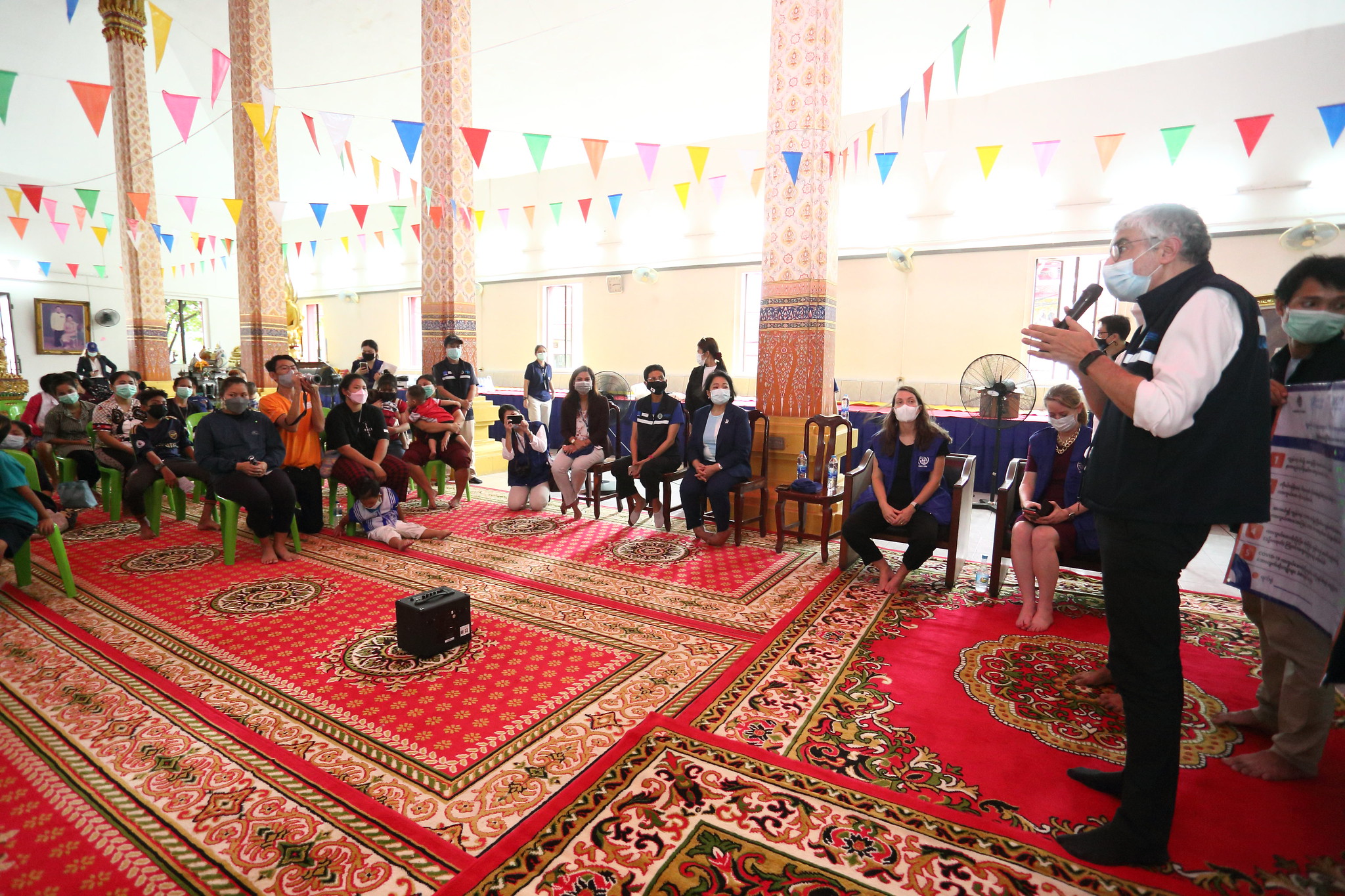The World Health Organization (WHO), he International Organization for Migration (IOM) and the World Vision Foundation (WVF) are working together to support the Thai Government in vaccinating migrants and educating them about COVID-19. Financially supported by the Australian Government, this project aims to strengthen COVID-19 vaccination efforts and ensure no one is left behind in Thailand's COVID-19 response.
Thailand is home to more than 3 million migrant workers from the nearby countries of Myanmar, Cambodia and Vietnam. The Government has initiated an inclusive policy to provide Covid-19 vaccines to documented and undocumented migrant workers and expats in Thailand to ensure everyone's safety and prevent rapid spread of the virus. Vaccines are provided to migrants free of charge by many stakeholders, including the Ministry of Public Health, the Chulabhorn Royal Academy, and the Thai Red Cross.

Dr Jos Vandelaer, WHO Representative to Thailand, delivers a welcome speech to migrant workers at Prayunmatham Temple, Pathum Thani – 24 March 2022 / © WHO/Terapong Taon
"Covid-19 does not discriminate. Everyone is at risk. Thailand has taken an inclusive approach to COVID-19, ensuring migrants and other communities can get vaccinated and ensuring no one is left behind. This requires a truly collaborative approach involving many stakeholders who work with the Government to ensure that migrant workers benefit from all the measures Thailand has put in place to combat and contain this pandemic," said Dr Jos Vandelaer, WHO Representative to Thailand.
To date, the project has administered vaccinations to 1,186 migrants in Bangkok, Pathum Thani and Samut Prakan.
Since late last year, there has been an influx of migrants from Myanmar and Cambodia who are returning to work in Thailand. Many of them either never received a dose of the COVID-19 vaccine, or have not completed the vaccine course. This is the key population the project wants to reach.
To achieve this goal, the project has employed many innovative approaches, including community outreach and mapping, risk communication in the migrants' languages, mobile vaccination services, and training and support to Migrant Health Volunteers.
On 24 March 2022, the joint team organized an outreach activity for a migrant community near the Si Mum Muang Market in Pathum Thani. About 40 migrant workers were educated about the risk of COVID-19 and how to protect themselves and received a relief package.. In addition, the team recorded their vaccination history and will arrange vaccination at a later date for anyone else in the community who need vaccines.

Migrant health volunteers facilitate a risk communication activity for migrant workers in Burmese – 24 March 2022 / © WHO/ Terapong Taon
One of the migrants who attended the outreach activity on 24 March is 16-year-old Jansuteera from Cambodia. She and her family have lived in Thailand for nine years as undocumented migrants. She said that thanks to this project, she and her family have received their first doses of the COVID-19 vaccine. "I feel safer now, but I'm still worried about contracting the virus," said Jansuteera.
"We are making it easier for migrant workers to access COVID-19 vaccines because they can prevent the spread of the virus and reduce the number of deaths," said Mr Sarawut Rachasrimuang, Director of WVF Thailand. He also expressed appreciation to the team of Migrant Health Volunteers, who deliver timely risk communications activities to the migrants.
Ms Amy Pope, Deputy Director-General, International Organization for Migration, said, "IOM and its partners are committed to increasing the COVID-19 vaccination coverage among vulnerable migrant communities, given its importance in limiting the transmission of the virus."
About 40 migrant workers participated in the risk communications activity at Prayunmatham Temple, Prathum Thani – 24 March 2022 / © WHO/Terapong Taon
One of the challenges the programme aims to address is the lack of vaccine documentation for migrants. The MorPhrom app, used by Thai citizens and residents to track their vaccination records, does not yet fully support undocumented migrants. This presents these migrants with challenges when applying for jobs, because many employers now require proof of vaccination. This programme tracks migrants to ensure that they receive a full course of vaccines and a booster dose, helping them integrate more safely into the country.
This project is one of many initiatives with migrant communities that WHO has supported since 2020. Other initiatives include the Training of Migrant Health Volunteers and establishing the COVID-19 hotline in migrants' languages, COVID-19 mass testing and mobile vaccination at construction workers' camps, and supporting migrants during self-isolation. These activities were supported by the European Union and the Government of Japan.



